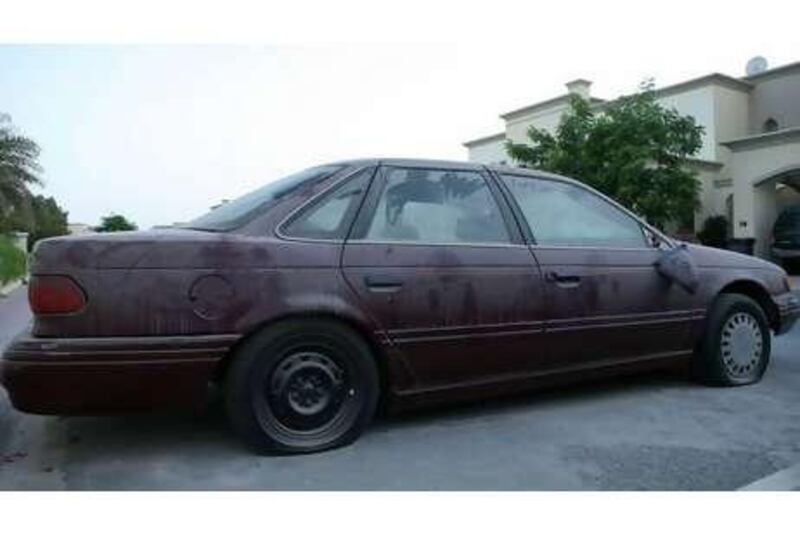Thousands of vehicles are being abandoned in Dubai each year by owners who flee the country unable - or unwilling - to repay their car loans. Cases of expatriates defaulting on their car finance deals and returning to their home countries - known by banks as "skip cases" - are on the increase, causing a headache for money lenders. The practice has led to a rise in the number of cars, often expensive luxury models, being left to gather sand in car parks or at the roadside.
Hafiz Amin, a spokesman for Dubai Police, said: "Because motoring is becoming more expensive, the owners are more inclined to give up their car when they can't afford the payments. "Some people buy a very expensive luxury car without calculating their real budget and they soon realise they can't afford the vehicle. "Sometimes, a car may sit idle for some time before being recovered because if it's not causing an obstruction and it's not reported to us or Dubai Municipality, we wouldn't know about it."
Cars abandoned by loan defaulters are impounded by the police after the bank has filed a complaint and the case is referred to the Public Prosecution Service. In the event of a skip case, Dubai CID notifies Interpol, which attempts to trace the owner. Seized vehicles are generally sold by the bank at monthly car auctions held at the Al Aweer used-car complex in Ras al Khor. Mohammed Aburashid, a member of Emirates Bank's legal department, said between 30 and 35 vehicles go to auction monthly as a result of non-payment of finance, of which 10 on average were skip cases.
"And that's just for our bank, so when you take into account other lenders, the figure must run into the hundreds," he said. Mr Aburashid said skip cases had become a serious problem and several banks and financial institutions were opting out of providing car loans. "If a customer can't pay, the bank will inform them that they will recover the vehicle and put it up for auction at Al Aweer," he said. "But sometimes, the customer will go to their own country without leaving any information.
"When this happens, the bank will go to the courts and file a case against the owner in their home country. "Skip cases are becoming a big problem and I know of two or three banks that have stopped financing cars because of this. "Often the owner will just leave their car at the airport and leave the country. The first we hear of it may be when we receive a call from the airport - sometimes this is several weeks after the car has been abandoned because airport staff believe the owner is on holiday and intending to return.
"We sometimes have to pay a charge of up to Dh20,000 (US$5,400) to the airport because the car has been parked there for so long. "We then go there [we] get the police to remove the vehicle and send it to the compound. "We would call the owner by telephone and ask them to settle the loan. "If not, we will auction it, file a case against him and send a letter to Dubai Police and CID, who will notify Interpol. They will then trace the person in their own country and try to get them here to face justice in this country."
Despite the occasional hefty parking fine from the airport and the legal task of chasing the rogue expatriate owner, Mr Aburashid said the amount banks find themselves out of pocket is negligible. "It's not like a credit-card debt where there is no asset involved," he said. "The bank still has the car." Mr Amin said that last year, more than 3,000 abandoned cars in Dubai and the surrounding area were towed away.
Each bank held monthly auctions at Al Aweer under the supervision of the General Prosecution department and Ministry of Economy to try to recover the outstanding balance on vehicles, he said. "The money raised through the auction is used to settle the balance on the car loan, but if there's a shortfall the owner is required to pay the difference," he said. "It happens a lot here and I think the reason is that getting car finance here is easy and also the fact that you really need a car in Dubai.
"They're even having to increase the size of the compounds holding the cars just to accommodate them." If there is no legal complaint, such as a loan default or illegal parking, attached to an apparently abandoned car, it is the responsibility of Dubai Municipality rather than the police to deal with. By law, the municipality's environment department is charged with removing abandoned vehicles from streets, car parks and public spaces.
Removed vehicles are kept at the municipality yard in Al Ghusais then auctioned if they are not claimed within six months. Dubai Municipality collects about 1,500 abandoned cars each year. trichardson@thenational.ae






